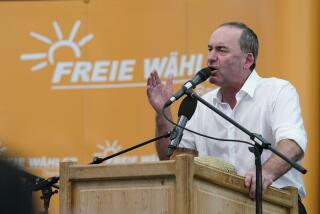Giving himself a stage presence
- Share via
VIENNA — In this city famed for its love of music, Chancellor Alfred Gusenbauer’s glaring involvement in who will run Vienna’s flagship opera house has made him a target for criticism that he is spending too much time on affairs of the stage instead of the state.
The Austrian government leader is a Socialist -- a party whose rank and file still is drawn from the European working class with a musical preference more Beyonce than Brahms. And the stocky son of working-class parents makes no secret of his origins.
But Gusenbauer, 47, is also a regular at premieres of the prestigious Vienna State Opera, where Vienna’s well-heeled and influential inner circle -- most older than 50 and politically conservative -- rub tuxedoed and gowned shoulders during breaks over dainty Viennese pastries and bubbly.
Certainly, no one can fault “Gusi” -- who says that the first record he ever bought, at age 15, was a long-playing vinyl disc of Beethoven’s Fifth -- for his love of the classics in a city that was home to Mozart, Brahms, Mahler and other musical titans.
Many are irked, though, by the prominent public role he has recently assumed in the search for a new State Opera director -- a position of enormous influence in Vienna, which still draws music lovers from around the world.
The city’s class acts include three opera houses, two acoustically and visually stunning concert halls and dozens of other venues. But the musical centerpiece remains the Vienna State Opera, whose enviable sales record -- despite ticket prices that can exceed $270 -- is close to 100%. It also serves as the venue for the annual Opera Ball that draws celebs from around the world.
Gusenbauer initially made no secret of his preference as a replacement for Ioan Holender, the opera icon who announced last month that he would not extend his contract when it runs out in three years. The chancellor is good friends with American star tenor Neil Shicoff, and Shicoff himself has indirectly expressed interest in the job.
But Gusi’s open support for the American quickly led to accusations of cronyism from opposition parties and the press.
“It is unbelievable that the ... chancellor has charged forward with the preference for his friend instead of waiting for the results of the internal [job] search which is meant to let the best candidate come to the fore,” fumed the small but outspoken rightist party BZO. And the environmentalist Greens ridiculed him as “an operetta chancellor who considers art important only if he can put himself onto center stage.”
Rejecting the criticism, Gusenbauer said he considers a “prohibition of talks between the chancellor and cultural figures ... a totally absurd idea.” He subsequently met with conductor Christian Thielemann, a possible candidate for musical director.
More to Read
The biggest entertainment stories
Get our big stories about Hollywood, film, television, music, arts, culture and more right in your inbox as soon as they publish.
You may occasionally receive promotional content from the Los Angeles Times.










